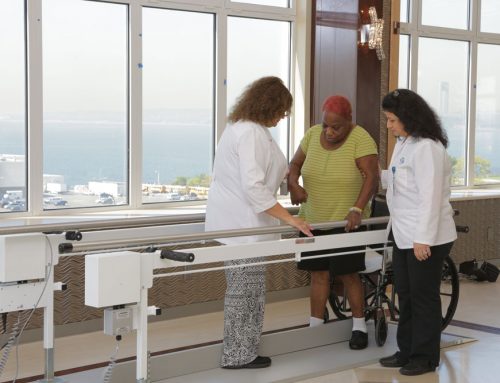Care for kidney failure is tricky since most people aren’t aware they have this medical issue until it’s too late to repair. If caught early enough, some treatment options can reduce the damage. This can include altering your diet to avoid any salt and potassium and taking medications. You may also require dialysis treatment to reduce your kidney’s workload until they heal.
The kidneys are responsible for removing waste and excess liquids from your body. They also assist in the creation of red blood cells and controlling blood pressure. When they fail, they are no longer capable of performing these tasks. If the issue isn’t caught early, there is no way to cure kidney failure, though treatment options are available.
At Haym Salomon Home for Nursing & Rehabilitation in Brooklyn NY, we offer medical and nursing care to our patients to help them manage their symptoms. We also provide treatment options, like on-site dialysis, and other treatments, including nutritional intervention.

For the proper care for kidney failure, it is best to speak to your doctor to avoid complications before booking any services. To learn more about how to care for kidney failure, take a look at the following information.
Care for Kidney Failure and Treatment Options
If you’re dealing with kidney failure, there are some treatment options available. Though it can’t cure the kidneys, proper treatment can help you maintain your quality of life. Altering your lifestyle is one method, including lowering your alcohol intake and making some dietary changes.
Dialysis maintains your kidney’s functions without forcing them to work too hard. A kidney transplant is another option, provided a compatible donor can be found. Using these methods of care for kidney failure, many people have lived long, productive lives.
Can you heal a failing kidney?
Unfortunately, many people don’t have any symptoms to warn them of possible kidney problems. In fact, most symptoms don’t even show up until the kidneys have already begun to fail. These symptoms can include weight loss, difficulty sleeping, weakness, swelling or muscle cramps in the feet and ankles, and a poor appetite.
Since these symptoms can also be related to other medical issues, most people don’t associate them with kidney failure. That’s why curing kidney failure is rarely an option. Instead, the care for kidney failure usually involves treatment meant to slow the progression of the issue.
What is the major cause of kidney failure?
There are several possible causes of kidney failure, though the two main causes are diabetes and high blood pressure. If you aren’t managing your diabetes properly, the result is high blood sugar. When left unchecked, such high levels can damage your kidneys and other organs.
High blood pressure forces your blood to travel at higher speeds through your blood vessels. Without proper treatment, there could be damage caused to the kidneys. If this happens, kidney failure care may be needed to prevent further damage.
There are also a variety of other issues that could cause kidney failure. A sudden loss of blood flow to the kidneys is one. This could be caused by allergic reactions, dehydration, heart attack, severe burns, or other conditions.
Other factors could include drugs, alcohol, infections, lupus, blood clots, or even antibiotics. To avoid kidney failure, maintain a healthy lifestyle, take medications only as directed, and follow your doctor’s advice for any known medical conditions.
This content comprises informative and educational resources only and can not be considered as a substitute for professional health or medical guidance. Reliance on any information provided in this article is solely at your own risk. If you have any inquiries or apprehensions about your medical condition or health goals, talk with a licensed physician or healthcare provider.






Leave A Comment